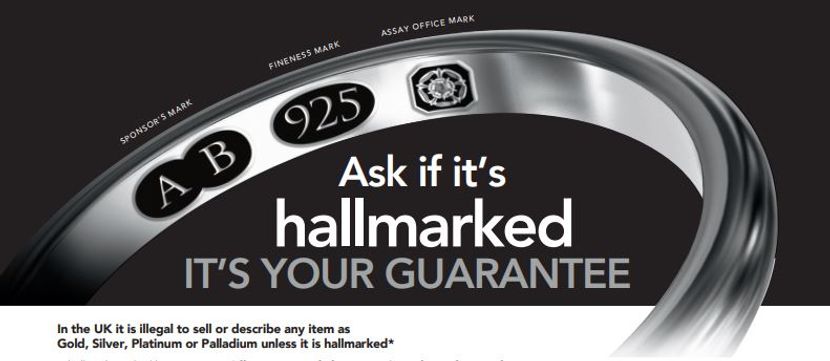Internet sales could see you breaking the law
Published: 14th May 2019

Did you know...
that if you sell articles made of precious metal via the internet, you are legally obliged to display the Dealers Notice on your website?
The law
The Hallmarking Act 1973 provides that it is an offence to describe, in the course of a business or trade, any article as made wholly or partly of precious metal (i.e. gold, silver, platinum or palladium) if that article is not hallmarked. It is also an offence to supply, in the course of a business or trade, an article described as made wholly or partly of precious metal, if that article is not hallmarked.
There are some exemptions from the hallmarking requirements. For example, where the weight of the metal content (precious metal and any base metal) falls below the prescribed minimum, it need not be hallmarked. The minimum weights are: gold 1.0 gram; silver 7.78 grams; platinum 0.5 grams, palladium 1.0 gram. There is also an exemption for articles intended for despatch to a destination outside of the UK (i.e. articles intended for export).
Internet sales
Sales of jewellery via the internet will usually be conducted in the course of a business and therefore hallmarking law will apply. Consequently, those businesses should ensure that any article described as made of a precious metal, either wholly or in part, should be hallmarked in accordance with the Hallmarking Act, unless the article is exempt.
Dealers’ notices and internet sales
The Hallmarking Act also requires any person engaged in the business of making, supplying, selling, or exchanging articles of precious metal (dealers) to display a notice explaining the legal requirements relating to hallmarking. The notice must be in the form and contain the content prescribed by the British Hallmarking Council.
The Hallmarking Act also requires the notice to be displayed in a conspicuous position in a part of “the premises to which those with whom he [i.e. the dealer] deals are commonly admitted” (Hallmarking Act s11(1)). It is an offence to fail to exhibit the notice accordingly.
Though the Hallmarking Act makes no express reference to the internet (it was drafted in a pre-internet era in 1973), the British Hallmarking Council’s view is that it applies to sales of, and other dealings in, articles made of precious metal conducted over the internet. The “premises” therefore for the purposes of the hallmarking legislation are the websites on which the articles are advertised and sold. In order to comply with the Hallmarking Act, the website should display the prescribed dealers’ notice in a prominent position, in order to promote the primary purpose of the provision which is to inform and ultimately protect consumers.
You can download a copy of the Dealers Notice herethe law
For more information please call 0114 231 2121 or email info@assayoffice.co.uk.
The Sheffield Assay Office was established in 1773, under an Act of Parliament and today the company assays and hallmarks the precious metals - silver, gold, platinum and palladium. Sheffield Assay Office is one of only four UK assay offices who all work to uphold the Hallmarking Act of 1973 and continue to ensure consumer protection for customers purchasing precious metals.
To find out more about the whole range of services offered by Sheffield Assay Office, such as our hallmarking and analytical services, please email us at info@assayoffice.co.uk or complete the contact form on our website at http://www.assayoffice.co.uk/contact-us ,
Sign up here to all the latest news from Sheffield Assay Office direct to your inbox